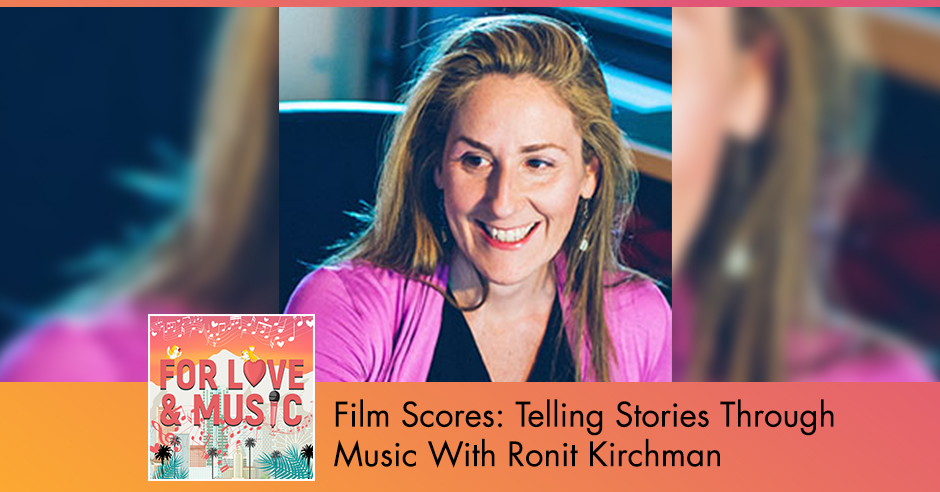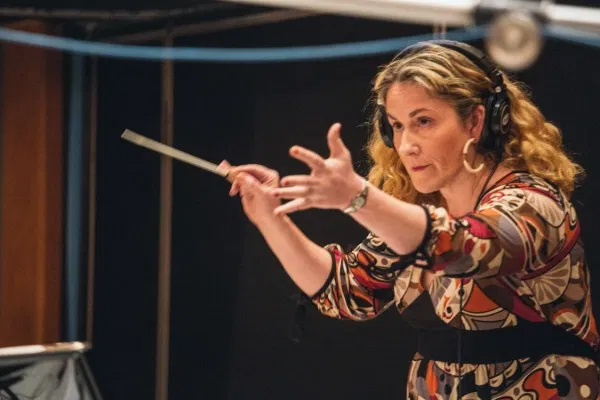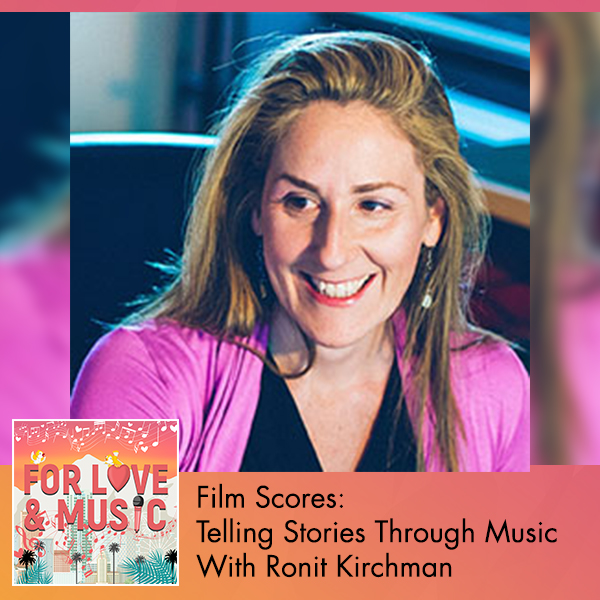
Film scoring is a very human art form. More than what we see in a film, the music behind it carries and heightens the very diverse emotions we feel. Taking us into the world of scores, Tara Joseph interviews the fabulous, Ronit Kirchman. Ronit is a composer, music producer, songwriter, singer, conductor, and multi-instrumentalist, who is best known for her innovative, genre-bending score for the acclaimed Emmy and Golden Globe-nominated anthology series, The Sinner. Here, Ronit shares with us her journey and the behind-the-scenes of working on this great project. She also tells us about some of her other projects, her musical family, her experiences as a woman in the music industry, and how she has been working amidst the COVIF-19 pandemic we are in. Follow along in this conversation to learn more about the world of scoring and telling a story through it.
—
Listen to the podcast here:
Film Scores: Telling Stories Through Music With Ronit Kirchman
With Special Guest, Ronit Kirchman
Our guest is a composer, a music producer, a songwriter, a singer, conductor and a multi-instrumentalist. Seriously, what does this woman not do? Please give a huge warm welcome to the fabulous Ronit Kirchman. Ronit, how are you?
I’m good, Tara. Thanks for having me on.
I like to ask everyone this, where are you based?
I’m based in Los Angeles. Right now, I’m in my music-making space, in my studio.
I have to say that I’ve spent a lot of time listening to your music and honestly, it’s amazing. We’ll get into The Sinner that you’ve scored all three seasons for shortly, but I listened to so much of all three seasons. The music blew me away. It took me on so many different journeys from happiness to fear and terror to elatedness. There are many feelings I felt. Thank you for giving me the opportunity to share your talents.
Thank you so much for listening.
Let’s kick-off then with The Sinner. Everyone should know this is a hugely successful series executive produced by Jessica Biel, who starred in the first season. We’re now on season three. Tell us about your journey with this show.
The show has been a unique project in many ways. It originally was conceived as a limited series. The first season was adapted from a book, which was a bestseller in Germany. Since it was the number one US cable show of that year, there was a desire to figure out what about the show where people are responding to and how can we continue it in a meaningful way? The producers and the showrunner, Derek Simonds, were intuitive and smart about how they chose to continue the essence of the show forward. It became an anthology with continuity so that the spirit of the show that it’s a wide done it that explores the collective subconscious and gets into the psychology of the shadow to why people turn violent? What are all the complex layered reasons behind that?
They took that essence and then allowed one character to provide the through-line for the story, which is the detective played by Bill Pullman, Harry Ambrose. There are many nuances in his performance that get a feeling for what’s underneath the surface. Especially this character doesn’t share a lot through words about how he’s feeling, so there’s got to be a lot of physicality to his expression, which there is. It’s great for a composer to work with when the performances are that strong.
Rather than have Jessica return and have this crime that was solved, somehow keep having material. They made a wise choice of asking, “What’s the detective’s journey?” which turned it on its head because in the book, the detective is not a primary character psychologically speaking. By making his perspective important and his journey important, you get this dynamic, this interactivity. It’s not just about solving a crime, but it’s about him confronting his demons as well. Since it’s been an emergent journey with the story and development of the story, as the composer, I’m also going on that ride of discovery. There’s a little bit of known, which is that we’re exploring this area of psychology and crime. I’m able to develop a new musical language for each series that also feels connected and part of the same world. It’s operatic in scope, not to overstate it, but it’s exciting because it’s the ultimate in long-form development. Not only is it episodic, but each season has to provide some new angle, some new degrees of insight and the music is integrated a key part of this show, in particular, the score. Finding the way to do that each season is an exciting challenge.
At what point do you get involved? Do you see the script? Are you given an outline? How do you start your creative process?
It's great for a music composer to work when the performances are strong. Click To TweetOn this project from season one, I did have the script. Generally, now I read the scripts as soon as they’re available for me to read. Before they shoot, I know the arc of the season. I can start to formulate some ideas about where we might be able to go. I’ll brainstorm and dive in conceptually with the scripts and then have conversations with the showrunner about what we might want to do this season and see what he’s excited about. In this third season, I wanted to introduce some new vocabulary elements. We arranged for some live recordings, which I conducted. We had a chamber string ensemble of nine players. The intention was very specific to create a focused intimate chamber sound that tells a part of the story that only a live ensemble can do. In the previous couple of seasons, there’s a lot of live playing, but it’s all played by me. I was excited to get some more bodies in the room, so to speak. That was a new thing. Doing that hinged upon having early conversations because the production schedule for us, once it gets into gear, it’s like an episode a week. You have to plan for it so that it’s possible to do it.
Have you found that one season has been easier to score than the other or has one been more challenging?
In terms of an ordinal scale, I’d say they’re about equal, just different qualities. That’s a very short answer, but that’s what I would say about it. I would say maybe in terms of the logistics because of taking care of the prep, the editing and pre-mixing of the live elements this time, logistically this was probably I find most challenging. I have a pretty well-developed infrastructure in place that allows me to keep on track with quick deliveries. This was an added component in terms of this show. Creatively speaking, it’s challenging but very inviting. There’s so much to work with and it’s a great team. It’s always inspiring to get the first scripts and get to use my imagination.
I’m very excited to see season three. As I mentioned, I was addicted to both of the first seasons. When I looked through your immense roster of achievements and work, you’ve done such incredible work from Limetown. That was on Facebook Watch, wasn’t it?
Yes.
Other films, Skinny Jeans directed by Brian Gattas. When I look at this list, do you have a favorite out of everything you composed for?
I would say they’re all favorites in different ways. I don’t like to prioritize one child over another. I wrapped an enjoyable and rewarding project, which is a film for Amazon and Blumhouse.
Also, it may be scary?
Blumhouse does a lot of horror stuff and scary stuff. This one is a unique one in that it does have scariness and action, but it also is a drama. It centers around some very warm, developed relationships and conceptually it’s cool.
When is that coming out? Do we know?
I’m not sure. We’re tying the ribbon on the present in terms of the production aspects. We don’t know when it’s going to drop yet. This one is a film, not a series.

I was listening to parts of season two of The Sinner and there were certain pieces within the score that were quite scary. I can hear how that can be a route that you could take basically. It’s beautiful but scary. It built this crescendo of intensity. I can’t find the word.
I love working with a material that lets me have a wide dynamic range. Sometimes a suspense thriller, that area gives you a lot of room to play musically, with sound design and how you’re doing things, but I’m also a songwriter. I also hopefully still have a sense of humor. I do like working on a wide variety of stories. Film scoring is a very human art form. You’re helping to tell a story. Humans have a full range of emotions and experiences. Sometimes you’re laughing, sometimes you’re crying, sometimes you’re terrified. Finding the music to express that is very rewarding. The variety is also rewarding.
Even on this last project, the quality of the emotions among the characters has a warmer tone, definitely asked for melodies and incorporated Indian instruments and musical influences. It was a completely different world. I like to change it up as much as I can. You ended up being up for certain kinds of things when your most successful thing is X. It’s like, “Sci-fi thriller.” Those requests are percentage-wise more because that’s what people are aware of and what they’ve heard, but I like to mix it up.
You also create theater scores as well. Another area that I was interested in how you explained further is you’re re-imagining film scores for live performance.
My initial entry into scoring for the narrative was in the theater. I continue to do that when my schedule allows when things come up. I love musical theater. I’ve written some musicals, rock opera and stuff like that. I’ve also worked on immersive theater projects where the soundscape is central to the theatrical experience. When I was working mostly in the theater in New York, it was a little while ago, but that immersive and importance of music in that environment was why I gravitated toward it. The productions I worked on tended not to be the kinds where you have ten seconds of music while they change the set. That’s so much fourth wall stuff, a little bit more out there and then your face. With the remix performances, it draws on my love of also as an improviser, I perform oftentimes on violin sometimes with voice and electronics and stuff and extended toolkits of things.
You are a multi-instrumentalist I’ve heard as well?
Yeah.
How many instruments?
I have not counted it. I try to add more and more as I keep working.
Do you teach yourself?
At this point, I often do. It’s been a while since I took a lesson for an instrument. I studied the violin very seriously. I went through the whole classical festival system and stuff. I considered that performance career for a while. I needed to be generating new texts. I needed more room to do that. For that reason, as a player, I have always gravitated toward improvisation as well. I’ve studied guitar quite a bit. Anything in the bowed and plucked string family is a friend and studied voice quite a bit. I’ve coached vocalists. I studied percussion. I even got to study tabla with Swapan Chaudhuri, which was a real treat. I wish I had time to go back and do more. There’s always more to learn. I’d love to have the opportunity to study with some more master musicians. Wind instruments I have to work on a little bit.
If you're scoring, you have to remember that you're helping to tell a story. Click To TweetIt’s funny you should say that because I was going to say I used to play the clarinet. I don’t know if you have the same grading system here, but in the UK, I’m originally from London. I got to Grade Seven when I was fifteen. I got distracted and now my clarinet is sitting next to me, but I don’t play it anymore. I don’t want to annoy my family because I’m off-key and I don’t know what I’m doing.
I bet that if you listen, it’s like, “Play me.”
I tried to teach my self how to play happy birthday, not so long ago. I used to be pretty good. I used to be able to read music well and everything. I’m very rusty. Wind instruments, they’re not your thing?
I love writing for wind instruments, the whole orchestra in terms of composing.
It’s not to play?
Not yet. It’s a long arc, so hopefully.
Talking a little bit about your family life, I understand you’ve got two sons. Are your sons musical?
They seem to be. We’re always singing in the house. There are always instruments around. My older one who finished kindergarten is learning the violin as well. It’s a lot of fun to share that with them. We’re always encouraging them to have it be something of their own, a natural language. It is fun. They’re both also gearheads like their parents. It’s fun too when there’s a little free time, show them into the studio and show them a few of the things that computers can do.
Is your other half musical as well?
Yeah. We met at the Sundance Institute when I was a fellow there. He’s the technical director. We were friends for many years and then started dating six years later after we had met. We shared a love of music and stories. It’s been a common vocabulary.
That’s a good lead into my next question because as you know, the podcast is called For Love and Music, which are the two reasons I moved to LA, one for love and one for music. I like to throw a little bit of love into the conversation as well. Has love ever helped you make an unexpected career decision?

Meaning like, because of relationships, I make a certain career decision?
Yes, or it could be, you could take it in any which way you like or it can be, “No, let’s move on to the next question.”
I’m open to that. Here’s what I would say. Before I met my husband, I did not think that I would end up with another musician necessarily. It was like a nice surprise to see that our personalities are complementary in a way. We’re a good fit and can share that. That was a surprise. Being able to share that has been a factor in deepening our relationship. We’re not constantly bouncing stuff off each other, but it’s nice to know that I trust his ear. If I want a little feedback, I can ask him for that.
Is there a song that is very special to the two of you that holds a special place in your hearts?
This is not a good answer because it’s not a song. We both have very wide interests and loves where music is concerned. It’s like the infinite appetite or appreciation for that is where we’re at. I had a joke that his appreciation for the early ‘80s, fusion e-rock is a little bit more than mine, but through our relationship, I’ve grown to appreciate it more. There are certain bounds like a rush that I respected, but was not like, “This has changed my world.” Scott’s ability to enthuse about it and show the details of its construction have won me over.
When I’m in my car driving along, I flipped between Sirius’ best of the ‘60s, ‘70s and ‘80s. I flipped between those three.
As a child of the ‘80s, I have learned to retroactively appreciate the structure, the songwriting and story in the ‘80s songs. They have big forms. They take you to a lot of different places. It doesn’t stay in one place narratively, which I’ve grown to appreciate more in retrospect.
I completely understand. Are there any directors who you would love to score for in film or TV?
That’s a long list.
Maybe your top two?
Denis Villeneuve is up there. I love Arrival so much. Ang Lee would be great to work with. I love his lyricism. He pairs it with this epic view of big themes that I feel are so literary. It’s amazing that he’s able to accomplish that within the market place.
If you have an amazing score that doesn't tell the story, then you haven't done the job. Click To TweetHe directed The Ice Storm, didn’t he?
I believe he did.
What can we expect to see here next? You mentioned your Blumhouse project, your movie. We’ve got The Sinner 3. That will be on Netflix soon, but it’s already available in the US?
The Blumhouse film will be streaming on Amazon at some point. I don’t know if there are theatrical plans for it or not. The Sinner Season 3 has dropped in the UK on Netflix. In the US, you can watch the first few episodes on the USA website. If you want the season, you can get it on iTunes. It’s been renewed for Season 4, which is exciting. We heard that announcement and we’ll see. I’m working on a couple of small film projects.
It will probably be up on Netflix in the US as well soon, wouldn’t it?
It usually takes a little longer for it to announce on Netflix in the US, but they do put it there eventually.
We’ve all been living through this COVID pandemic. Have you felt that it has affected the way that you work? As a composer, you self-isolate, don’t you to create? Has it been a different process because you’ve been forced to isolate?
I feel fortunate that a lot of the things that are involved in the job of composing are still possible to do. That 90% that’s in the studio writing and recording. It is a shift when you’re working on an LA-based project to never meet your collaborators in person. When the vibe is good, the technology allows you to connect anyway. Definitely, in terms of recording, that’s a big difference. The session that I did for The Sinner, I would have had to multi-track each player on their parts, you don’t get the same ensemble interaction or sound. If you A, B the sounds of an ensemble playing in the room, and we got to record a capital, for example. It responds differently when everybody is playing at the same time and responding to each other both musically and also sonically.
There are some great workarounds at this point since the remote thing has become a necessity for so long. There are some great remote recording options. It is more laborious. You can get 95% there. That’s the area that’s been the most affected. As a performer too, I feel like for music that in-personness is by analyzing it changes the music itself. We all feel a shift, even those of us who are working primarily in the studio. In terms of the flow of projects in terms of live-action, there are some things that finished shooting right before things stopped. There are only so many projects that fall into that category. We’ll see what happens. Hopefully, people will able be able to safely open back up shooting the way they’re planning. It’s health first.
That goes without saying. It’s extraordinary the way that not everyone feels the same way as you and me.
There’s always a diversity of viewpoints.

One thing that I love when I speak to successful women in the music industry. There aren’t enough successful women, people in a high position. You have got so many amazing achievements and more to come. Have you found that being a woman in the industry has made life more challenging or not?
We’re now at a point where we can talk about that without being considered a drag. In terms of gender issues, the past few years, since the #MeToo Movement, lots of information surfacing about different people and stuff. It changed the culture hopefully permanently so that people are able to recognize in particular subconscious bias. A lot of people don’t necessarily have super extreme. Some people don’t have extreme stories of harassment or whatever. The overall culture, for example, in composition, when you look at the numbers, the fact for television a few years ago, the percentages were like 5%, I don’t know if it’s scripted and unscripted, but it’s like hovering in that area.
For a feature film, it’s like 2% or 3%. Those are crazy low numbers reflect that there’s bias at work. I have to tell you that even several years ago, many people who would never say this now would be on panels saying that perhaps women weren’t interested in this line of work. Maybe that’s why we don’t see that many of them do this job, which is mind-bogglingly false. It was already evidenced by the fact that even if the classical world opens up to more women composers a little earlier than the film scoring world did. There are a lot of reasons built into a relationships-based industry why that could happen. It’s like film scoring as an art form.
In general, people feel sometimes risk-averse because it’s an art form that’s hard to grasp. If you know that somebody has completed a certain number of things, you don’t have to worry about that component. For hiring entities, that knowledge was part of the picture, for sure, not the complete explanation. They don’t want it to be messed up. That basic business concern is guiding, but now it’s interesting that businesses are feeling and the individuals who are working within them. There’s like for sure, a bottom line and also there’s a responsibility as well. That awareness of connectedness with the population, the community that ultimately the product is serving. It’s all positive now on it. It’s maybe perhaps in my bubble, but at least it’s gotten to the point where people will be embarrassed to say sexist things.
People have to be very careful now.
That’s a good thing for now because what it means is that people are having to be aware of what their underlying thoughts are. Rather than see it as some restrictive thing, it’s more like building awareness. People who didn’t realize they had certain opinions are now realizing, “I was ruling out women for this project and I shouldn’t have.”
One final question, for any of our audience out there who are young and keen to get into film, TV, scoring, theater scoring, what advice would you give them?
It’s important to start making stuff. Finding collaborators at a level where they’ll have you. If you’re a fellow student, school is a great place to make creative friends. Whether it be undergrad or graduate or in high school. Embrace the collaborative aspect of it. Just realize that’s not like an extra part of the job. That’s the job. If music needs to be the only focus, there are other ways to go. If you’re scoring, you have to remember that you’re helping to tell a story. Ultimately, the quality of the music is going to be something that you’ll probably care the most about. Everybody will love having an amazing, beautiful score, but it first needs to do the job of telling the story.
If you have an amazing score that doesn’t tell the story, then you haven’t done the job. That’s an aspect of the job that is. Feeling into whether that’s a good fit is important. If you’re not sure, try it on and see. Having an open mind is important. Seeking out mentorship programs, when you’re at a certain level, especially, through BMI and ASCAP, the SCL. For women composers, there’s the Alliance for Women Film Composers. I’m on the board of that organization and we’ve launched our first mentorship program. We have a lot of programs that anybody can tune into. It’s possible to be a supporting member, even if you’re not a woman composer. Film independent, AFI would start looking on the independent level and also think about who you might want to work for. See if you can get a position helping somebody out because learning the workflow can be greatly expedited if you’re in the room where it happens.
Ronit, thank you so much for being a guest. You’ve been absolutely amazing. I wish you all the best and loads of success with everything that’s happening for you. Come back at any time.
I’d love to. I hope you enjoy Season 3, let me know.
Learning the workflow can be greatly expedited if you're in the room where it happens. Click To TweetI absolutely will let you know. I’m going to watch it.
Thank you so much, Tara.
Thank you too. Thank you to all our fabulous guests, keep tuning in. You’ll be hearing from me again very soon. Stay safe.
Important Links:
- Ronit Kirchman
- Alliance for Women Film Composers
- www.RonitKirchman.com
- https://www.Instagram.com/ronitkirchmanmusic/?hl=en
About Ronit Kirchman

is a composer, music producer, songwriter, singer, conductor, and multi-instrumentalist. She creates music for film and television, theater and dance, multimedia installations, and the concert stage. She is also an accomplished visual artist and author.
Recognized in the press as “an extremely original voice” with “a virtuoso touch”, and “a truly unique force in the entertainment industry”, Ronit is probably best known for her innovative, genre-bending score for The Sinner—the acclaimed Emmy and Golden Globe-nominated anthology series executive produced by Jessica Biel and currently in its third season. Ronit also recently completed the score for the thriller series Limetown, based on the hit podcast. Ronit’s widely varied film scores include the features Zen and the Art of Dying, Finding Neighbors, and The Skin I’m In, as well as The Golden Age of Fish, Say You Love Me, and Gowanus, Brooklyn among others. Ronit’s soundtracks and composition albums are commercially available through Lakeshore Records and Wild River Records.
Kirchman is known for her impressive stylistic breadth, depth, and originality, as well as a remarkable cross-disciplinary understanding of storytelling and creative collaboration. Ronit was the first-ever recipient of the Sundance Institute Time Warner Foundation Fellowship in Film Music, and has also been awarded the Sundance Composers Lab and Documentary Composers Lab Fellowships, BMI Conductors Fellowship, and a Subito grant from the American Composers Forum.
Ronit is an innovative violinist known for her virtuosity, continually expanding stylistic palette, and sonic range. She began playing at the age of four, and trained with some of the world’s finest violinists, including Erick Friedman, the protégé of Jascha Heifetz, and Zvi Zeitlin. In addition to the violin, Ronit plays an electric 7-string violin which extends below the cello range. She performs as a singer, guitarist, and on various other stringed instruments as well as computers, electronics and percussion. Solo violin performances by Ronit can be heard on the scores for The Finest Hours, Now You See Me, Jessabelle, and the Emmy-nominated Ring of Fire, among many others.
Ronit’s film scoring work spans many narrative genres and musical styles. Equally at home writing for large acoustic ensembles, minting a pop hook, programming electronics, and working with master improvisers, Ronit brings great versatility, imagination, and precision to all of her scoring projects. Her discography includes work as a performer, producer and arranger, with recordings on Lakeshore Records, Wild River Records, Rounder, Rhino, Nine Winds, pfMentum, emr, Meta Records, Innova, Biophilia, and Vitamin. She performs and records internationally in many contexts, including free improvisation, classical, live electronica, rock, pop, jazz, world, blues and country. Her collaborators have included such notable artists as Torsten Müller, Anne LeBaron, Nels Cline, Fred Frith, Bertram Turetzky, Wolfgang Fuchs, the Rova Saxophone Quartet, Pat Thomas, John Edwards, Philipp Wachsmann, Wadada Leo Smith, Adam Rudolph, Paul Lytton, Vinny Golia, and alt-country band Hem. She was the co-curator and featured performer at Film Music Remix at the Sundance Film Festival 2012.
Kirchman’s theater music scores include an LA revival of Stop Kiss, an original chamber opera, and productions with the Lincoln Center Theater Directors’ Lab, Target Margin Theater, and Peculiar Works in New York City. Her concert works include Reparts, an orchestral piece premiered by the New Century Players of Los Angeles, and Departures, which pairs a jazz ensemble with live audiovisual computer instruments using the narrative of Casablanca and visual film elements as the framework for improvisation.
Ronit is also a pioneer in re-imagining film scores for live performance in her ongoing Remix Anatomy series, with performances sponsored by FilmForum Los Angeles and the Sundance Institute. She has also had the pleasure of conducting her film scores with live orchestra at The Wiltern with The Future Is Female concert series and other gala presentations.
Ronit has been a resident composer and lecturer at Columbia College of Chicago MFA Film Scoring program, and a guest lecturer at CalArts and Occidental College, as well as festivals such as FMP/ Berlin, on various topics including film scoring, narrative and movement-based approaches to musical improvisation, Feldenkrais and performance practice. Ronit graduated magna cum laude from Yale and holds an MFA in Composition/New Media from California Institute of the Arts. As an alumna of the Sundance Composers Labs, Ronit has returned to the lab several times to contribute her talents as a creative advisor, making herself available for collaboration in recording sessions and highlighting some of the potentials of working with creative musicians on narrative projects.
Born and raised in NYC, Ronit currently resides in Los Angeles with her husband and two children.

